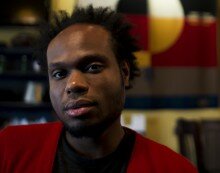
Jamaal May’s first book, Hum (2013), won a Beatrice Hawley Award, an American Library Association Notable Book Award, and was an NAACP Image Award nominee. Hum explores machines, technology, obsolescence and community; in an interview, May says of his first book, “Ultimately, I’m trying to say something about dichotomy, the uneasy spaces between disparate emotions, and by extension, the uneasy spaces between human connection.” For May, the need for human connection is of the utmost importance. In an interview with The Normal School, May states, “Poetry, along with every other art, is a tool for teaching and expanding empathy. Violence and injustice cannot endure empathy.”
Detroit, where May was born and raised, is a frequent subject of his poetry. At the Southeast Review, May states:
“There Are Birds Here”, a poem dedicated to Detroit, illustrates the ways in which May’s work engages the personal through the political, and vice versa:
his neighborhood is not like a war zone.
I am trying to say
his neighborhood
is as tattered and feathered
as anything else,
as shadow pierced by sun
and light parted
by shadow-dance as anything else,
but they won’t stop saying
how lovely the ruins,
how ruined the lovely
children must be in that birdless city.
Anxiety is another frequent theme of May’s poems. Marty Cain, reviewing Hum at HTMLGiant, noted that, “the poems in Hum exhibit an anxiety about death, decay, and in particular, stagnation . . . Anxiety is not only a driving theme in the collection, but is its structural backbone – the book is organized around a series of poems about phobias.” Anxiety carries over into May’s newer work, too:
like insects running from my breath?
Am I a god then? Am I insane
because I worry about the disassembling of earth
regularly? I walk more softly now
into gardens or up the steps of old houses
with impatiens stuffed in their window boxes.
When it’s you standing there with a letter
or voice or face full of solemn news,
will you hold your breath before you knock?
– from ‘Respiration’
In a blog post at the Poetry Foundation, May talks about the ways in which sociopolitical work and anxiety are related for him, specifically in his poem “Pomegranate Means Grenade”. The poem invokes a former student of May’s, as well as Huang Xiang, a Chinese writer, calligrapher, and activist for human rights and free speech. May writes:
[ . . . ]
To truly write to the core of human experience I have to be at least as exposed as the hearts of children. Emotionally connected writing demands no less.
May’s honors and awards include a Spirit of Detroit Award, an Indiana Review Poetry Prize, and fellowships from Cave Canem, Bread Loaf, The Frost Place, the Lannan Foundation, and the Stadler Center for Poetry at Bucknell University. He is the 2014-2016 Kenyon Review Fellow at Kenyon College and a recipient of the Civitella Ranieri Fellowship in Italy. May has taught poetry in Detroit public schools and worked as a freelance sound engineer. He has taught in the Vermont College of Fine Arts MFA program and codirects Organic Weapon Arts.
Bibliography
Poetry
The Big Book of Exit Strategies, Alice James Books, Farmington, Maine, 2016
Hum, Alice James Books, Farmington, Maine, 2013
Links
“Conduit: Connecting All the Stampeding Hearts”, blog post by Jamaal May, PoetryFoundation.org
Poetry magazine podcast for April 2013 discussing poems by Jamaal May and more, PoetryFoundation.org
Listen to Jamaal May read “Hum for the Bolt”, PoetryFoundation.org
Listen to Jamaal May read and talk about “Shift”, PoetryNow
Jamaal May’s website
Interview by Stacey Balkun, The Normal School
Interview by Anna Claire Hodge, Southeast Review
The Sunday Poem: Jamaal May’s Hum, Gwarlingo
“Jamaal May – Detroit Humming Inside Him”, Huffington Post
Conversation with Jamaal May, Kenyon Review

